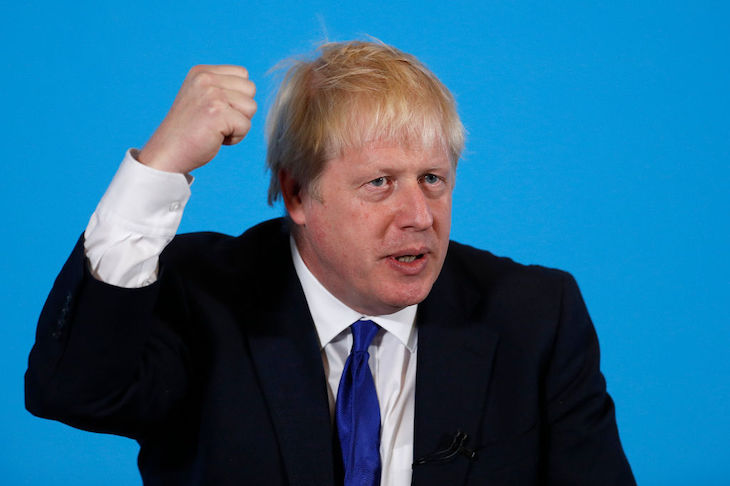Westminster is, naturally, fixated on Boris Johnson and his first speech since his Conservative leadership victory. But it’s just possible that the most interesting and important speech of the day took place in Scunthorpe.
That’s where Andy Haldane, chief economist of the Bank of England was delivering a speech called ‘Climbing the Jobs Ladder’. His speech was, nominally, about wage progression and the quality of employment. But about halfway through, the speech becomes something very different, something that looks an awful lot like a warning to a new prime minister: don’t bank on the Bank to bail you out over Brexit.
Haldane’s argument is that the major downside risks to the UK in the coming years (Brexit and a global trade war) inflict harm on the UK economy by reducing/depressing the capacity of business to generate profit, employment and wage growth. The last economic downturn was felt mostly on the demand side of the economy (people and businesses couldn’t get money to spend, and didn’t want to spend the money they did have), something that central banks have, more or less, addressed through very loose monetary policy, which makes it easier and cheaper to get money.
But the next crisis, he argues, is likely to be on the supply-side, as economic and political change disrupts businesses’ long, international supply chains and makes it harder and less attractive for firms to invest in the training and equipment that makes them more productive and profitable. And that, Haldane argues, is a problem that monetary policy cannot be used to fix (even if the Bank’s own mandate and inflation target would allow them to be used.)
What does this esoteric economic stuff have to do with Boris Johnson and his ‘new spirit of can do’?
Simply it comes down to a senior figure at the Bank of England telling the new PM that he cannot rely on the Bank to cushion the economic blow of a bad Brexit (or another downturn-inducing event). Instead, the only hope of dealing with any shock lies in tax policy and structural reforms that are the preserve of government. And which politics in its current broken, divisive state is very badly placed to deliver, of course.
Haldane’s last paragraphs should be read in full at Westminster:
Consider the effects of Brexit uncertainty on the UK economy. By far the largest effects have been on companies’ investment and productivity. According to our Decision Maker Panel, investment among UK companies is estimated to be between 6-14% lower, and firms’ Total Factor Productivity (TFP) around 2-5% lower.32 These are large negative shocks to the economy’s supply-side potential. They are hits that monetary policy is not itself well-placed to mitigate. There is a risk of people normalising the deviance in monetary policy since the crisis. Around a quarter of adults in the UK working population have never experienced Bank Rate above 1% in their adult lives. In these changed circumstances compared with a decade ago, it is important that monetary policy is not a prisoner of its past, that the monetary cavalry are not called at the first whiff of grapeshot, that a dependency culture around monetary policy is not allowed to develop. A decade ago, central banks were the only game in town and monetary medicine was the right prescription. A decade on, the game has changed and so too might the policy prescription needed in dealing with any downturn. When the challenges, as well as the huge opportunities, lie on the supply-side of the economy, the right medical prescription is fiscal and structural policies. Super-charging the supply-side of the economy is what is now needed. That is every bit as true here in Scunthorpe as it is elsewhere across the UK.
Now it’s possible that I’m reading too much into those words. But once upon a time I made my living reading and interpreting the professionally gnomic words of central bankers and Haldane’s speech strikes me as significant for the new PM and his government.
Some of the words are not wholly new: the Bank’s views on Brexit and the need for supply-side reform are well-established. But context matters too. The mere fact of the speech being given today is another important sign: it is unthinkable that the Bank issued this speech on this day by coincidence.
What will all this mean for relations between the Bank and the Boris Johnson government? I cannot tell. But I believe that relationship will be significant and worthy of more attention than it currently gets. The new PM will soon enough appoint a new governor of the Bank, an enormously important decision.
More widely, the Bank has often been on the target-list of Brexiteer Tories intent on burning down every British institution that fails their purity test; the spectacle of the Bank’s chief economist (and candidate for governor?) warning that the Bank cannot (will not?) rescue Britain from the consequences of Brexit is unlikely to make relations more harmonious. Time for Westminster script-writers to add ‘Boris and the Bank’ to their list of storylines for the months ahead.







Comments